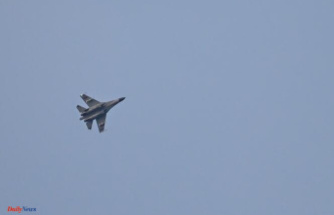Iran unveiled a new ballistic missile on Thursday, the longest-range to date, days after the head of the Israeli armed forces, Herzi Halevi, hinted at the possibility of "action" against Tehran for the development of its nuclear program. .
The new liquid-fueled ballistic missile is a developed version of Iran's Khorramshahr projectiles and has a range of 2,000 kilometers and a 1,500kg warhead, the official IRNA news agency reported. The missile can hit Israeli and US bases in the Middle East. "Our message to Iran's enemies is that we will defend our country and its achievements. Our message to our friends is that we want to help regional stability," Iranian Defense Minister Mohammad Reza Ashtiani said during the presentation.
Tehran lavished a show of force in a symbol-filled ceremony against its enemies amid heightened tensions in the Israeli-Palestinian conflict, with the breakdown of the fragile ceasefire in Gaza between Israel and the Palestinian militant group backed by Iran, Islamic Jihad (YIP). The new missile has been baptized as Kheibar, in reference to a Jewish castle invaded by Muslim warriors during the irruption of Islam. At their presentation, the authorities placed next to it a miniature example of Jerusalem's Golden Dome of the Rock, a holy site in both Islam and Judaism.
In recent years, Iran has expanded its missile program, particularly ballistic ones, despite opposition from the United States and European countries. Tehran has reiterated that it sees the development of its ballistic missiles as a deterrent and retaliatory force against Washington and its adversaries in the region.
The nuclear deal in 2015, formally known as the Joint Comprehensive Plan of Action, forced Tehran to curtail its nuclear program in exchange for freedom from international sanctions. Two years later, Iran presented the new Khorramshahr ballistic missile, which provoked a harsh reaction from then-US President Donald Trump. He threatened Tehran with breaking the pact, creating great uncertainty in the region. The deal fell through soon after, in 2018, when the United States unilaterally withdrew and reimposed sanctions on the country. Tehran for its part, suspended its part of the deal, including its commitment to curb nuclear development and uranium enrichment. At all times, Iran has actively and passively denied that it is developing nuclear weapons.
In January 2020, Iran launched a missile attack against US forces in Iraq in retaliation for the Washington-ordered assassination of Revolutionary Guard commander Qasem Soleimani and his Iraqi deputy lieutenant, Abu Mahdi al-Muhandis. Since then there have been several unsuccessful attempts by international actors to relaunch the stalled nuclear deal.
A few days ago, an investigation by the Associated Press agency pointed out that Iran had built an underground system near a nuclear enrichment facility, raising concern among international leaders about Iran's nuclear development.
The person in charge of the Iranian nuclear program, Mohamad Eslami, insisted that his government will cooperate with international inspectors to show the "new activities" and called the new information "psychological warfare" against the country.
According to the criteria of The Trust Project












